by Meera Satpathy, Founder & Chairperson of Sukarya
Ranju is a 14-year-old rag picker who supports her family’s income by selling scrap. Her father is an alcoholic. She studied till class IV and dropped out. Her anger issues got her into frequent fights with other children. When Sukarya’s outreach team met her and told her about the Education on Wheels (EOW) project for out-of-school children, her eyes lit up. However, she was not sure if her father would agree to her attending classes. Also, her home environment was hardly conducive to studying. The team spent a few weeks counselling her family members. Today, Ranju is 18 years old and has taken her class X exams and is integrated into mainstream formal education. As part of the EOW and adolescent girls’ program she is now confident of carving out a future for herself. Her mother, who had several miscarriages and was weak and malnourished, attended Sukarya’s health camps where doctors and nutritionists helped her address her medical ailments. She is now working in domestic help and has assured Ranju that she will help her fulfill her dream of becoming a nurse.
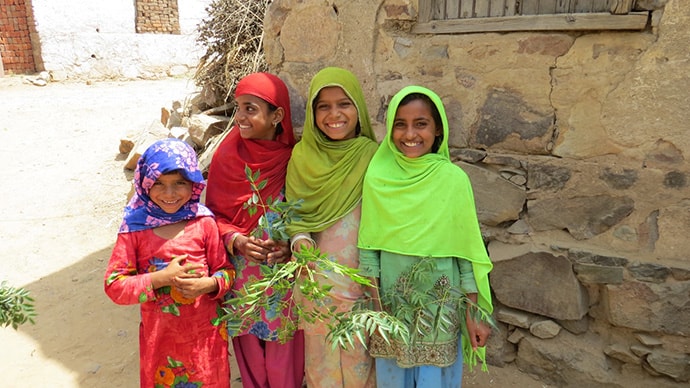
Photo credit: Sukarya.
According to India’s National Sample Survey, as of date, more than 32 million children have never been to school. Nearly 80% of migrant children across seven Indian cities lack access to education near worksites even as 40% children from seasonal migrant households are likely to end up as child labor in the unorganized sector instead of being in school, according to the UNESCO’s 2019 Global Monitoring (GEM) report. The report also cites the lack of schooling and a structured environment as a key reason for these children being exposed to exploitation, abuse and trafficking. It is not uncommon to find many children from urban slums getting sucked into a life of crime and delinquency. Also, poverty, unemployment, and large family sizes pushes them towards acute malnutrition, anemia and other deficiencies which impact their adolescent and adult lives.
Sukarya’s work in Delhi, Haryana and Rajasthan have shown that no work on maternal mortality and education can be complete without keeping the interest of adolescent girls in mind. Across its project sites in makeshift slum colonies, many of which are unauthorized with transit migrants and the poorest of the poor, Sukarya runs its projects on education, gender equality, and health care. The strategy has always been to partner with the communities and work with them while recognizing their unique situations, then customizing interventions to suit their needs. Earning the trust and confidence of the communities has helped Sukarya prioritize its interventions and focus on an integrated holistic model that ensures sustainable growth with long-term impact.
A mobile school that brings the classroom home
Sukarya’s Education on Wheels (EOW) project is aligned with the government’s “Education for All” motto. It is a fascinating program that brings the school right to the doorstep of the student. It gives those children a chance to complete schooling who had otherwise abandoned it or never had the chance to enroll in the first place. Children who are engaged as rag pickers, shoe shine boys, domestic help, labor in the organized sector, or simply who have to manage younger siblings while parents go out to work are the biggest beneficiaries.
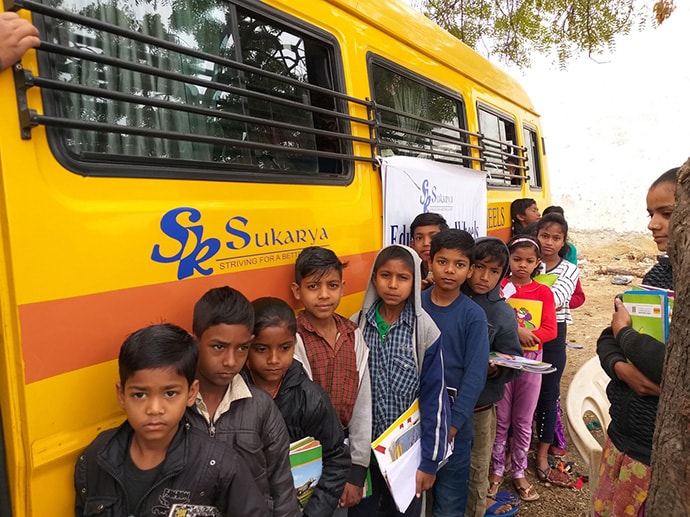
Photo credit: Sukarya. Education on Wheels.
The mobile EOW bus is well-equipped with computers, television, blackboards and other essential education related materials. It moves with teachers on-board to multiple locations. The motto of EOW is to provide accessible, affordable and efficient education to marginalized communities and go the extra mile in reaching the unreached. The goal being to put students back into school and also coach and guide them on life skills, health, nutrition, careers and values.
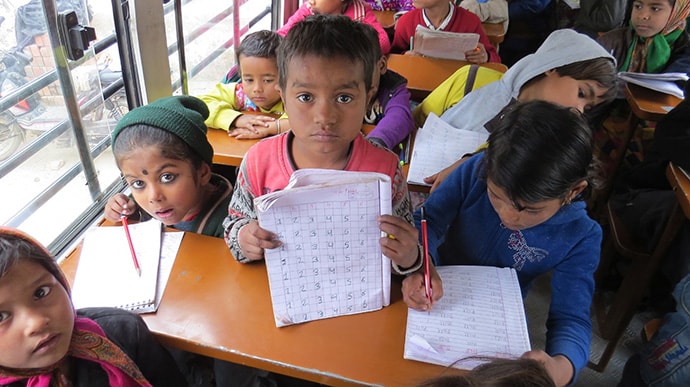
Photo credit: Sukarya. Education on Wheels.
Gender empowerment: an integral part of Sukarya’s work
Nearly 120 million, or 10% of India’s total population, comprises of adolescents. In rural and semi-urban settings, their lack of access to information makes them vulnerable at the hands of family and others. Deep-rooted socio-cultural customs and norms push them into child marriage, early and repeated motherhood, lack of education, ill-health, gender-based violence, discrimination, and even trafficking. Girls are particularly disadvantaged because of gender norms that are tilted largely in favor of boys. This impacts not only their education but also nutrition, reproductive and sexual health, and their being marginalized in property and financial matters.
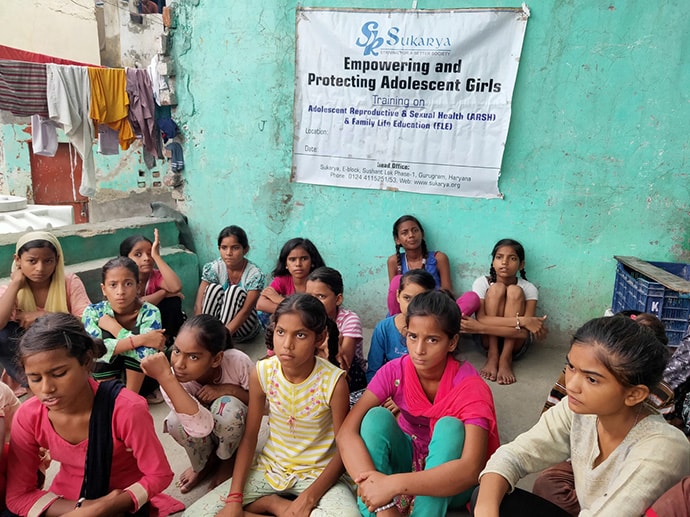
Photo credit: Sukarya. Gender Equality class.
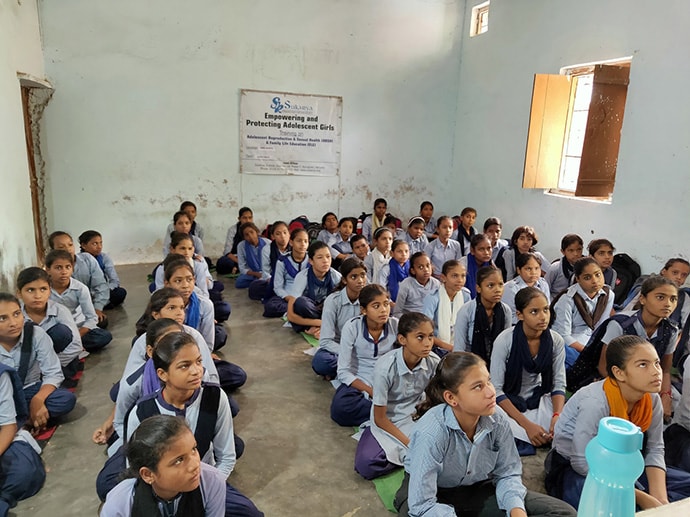
Photo credit: Sukarya. Gender Equality class.
Gender education is all but non-existent in urban slums where most families battle vulnerable and resource-strapped conditions. With a customized curriculum that addresses adolescent health, menstrual hygiene, nutrition, family life skills, and gender knowledge, efforts are made to instill confidence and leadership skills so they can fight economic and social inequalities which they face on a near daily basis in their lives.
Impact of COVID-19 on ongoing programs and what we learned
The pandemic impacted most development programs and Sukarya was no exception. Outreach teams that have a strong connect with families and households providing them information and support on immunization, antenatal and postnatal check-ups for pregnant women, advice on nutrition, and counselling on domestic abuse, played a major role in maintaining equilibrium in the community. The pandemic caused lot of disruption with an initial sense of disbelief and denial that later turned to fear and paranoia. Misinformation contributed to irrational behaviors leading to stigma and discrimination against those who had COVID. Loss of jobs especially amongst migrants led to severe mental health issues accompanied with hunger. The experience of loss and grief was rampant – be it losing a loved one or a job or parent. The worst sufferers were again children.
Education has been hit particularly hard by the COVID-19 pandemic. Without access to education, as shocks are experienced – including loss of life, health impacts and loss of livelihoods – children are more vulnerable and unprotected. As household finances are being strained and needs increase, out-of-school children are more likely to be exposed to risks like family violence, child labor, forced marriage, trafficking, and exploitation. For the most vulnerable children, education is lifesaving.
Sukarya put together a dedicated plan to ensure continuity using digital platforms like Zoom and WhatsApp to stay in touch with communities. Apart from advocating COVID appropriate behaviors they launched a massive drive to provide dry food rations and health kits with masks and sanitizers to families who had no resources to keep safe and be free of hunger. Donors stepped in to help expand outreach allowing Sukarya to reach more households in extended locations. On a case-to-case basis help was provided with respect to medicines, in-kind donation, support for elder care, counselling for mentally distressed people and raising funds for those in need. Simultaneously a drive was launched to tackle vaccine hesitancy and help people register for vaccines. While the pandemic threatened to undo the gains made over the decades, Sukarya overcame a lot of the challenges by adding the COVID dimension to its programs which will be modified and adapted depending on the evolving ground situation in the months and years to come.
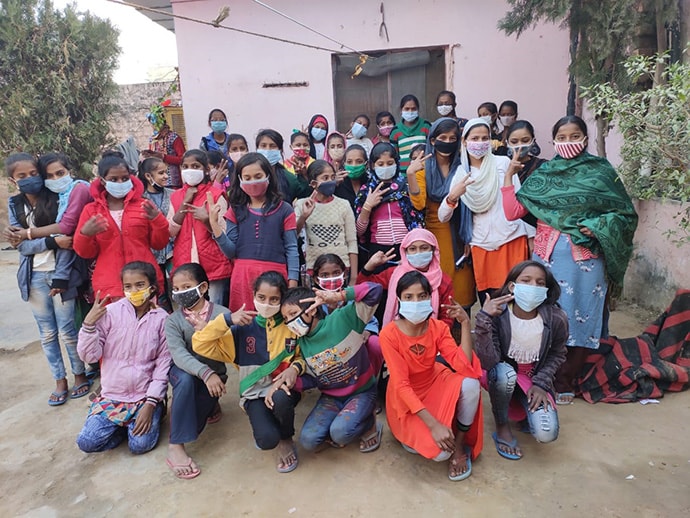
Photo credit: Sukarya.
We have learned now in a hard way that child welfare is important, mother and child health is important, financing education of children is important. Since we need strong public health security children and adolescents should be trained to manage health disasters.
Digitalization has become crucial and we have learned that use of technology can help to a great extent under such dire circumstances. Technology and digital health interventions have already proven to be “connectors”. Community members too have adopted them, given the access to smartphones and improved internet connectivity. This has helped Sukarya introduce COVID appropriate strategies to ensure continuity and upgradation of services with respect to mother and child health, adolescent empowerment, capacity building of youth leaders, grassroots functionaries and staff members. Technology partners are helping upgrade monitoring mechanisms for greater efficiencies.
The Covid crisis has had an impact not only in the health and economic situation, but also on the psychosocial well-being of societies. Hardships associated with socioeconomic effects, fear of the virus and its spread, and other related concerns have impact on the mental health of the people. Mental health maters most.
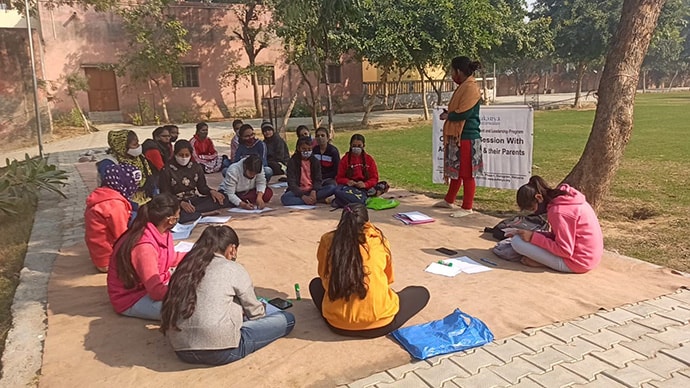
Photo credit: Sukarya. Gender Equality class.
Besides the doctors and nurses, teachers are really the most essential people as they are crucial for the community to provide education during the pandemic as remote learning, and online working has become the most dependable channel of communication for students of all age groups.
The cruelty of Covid taught us that isolation is everybody’s problem and it can take a huge toll on everybody’s mental health. It constantly conveyed the message that family is the strongest institution and happiness lies in little things, like helping each other, taking care of each other, and doing the smallest of things in the hardest times.
Sukarya needs support and funding from organizations and agencies to continue our mission “Striving for a Better Society.”